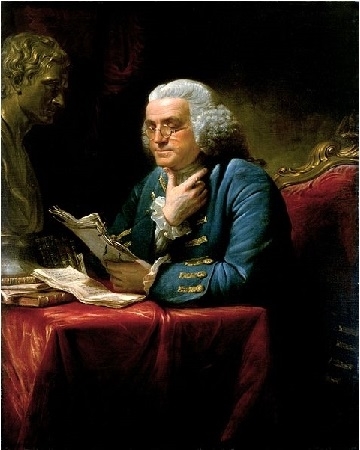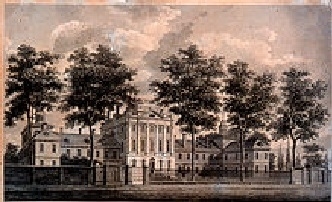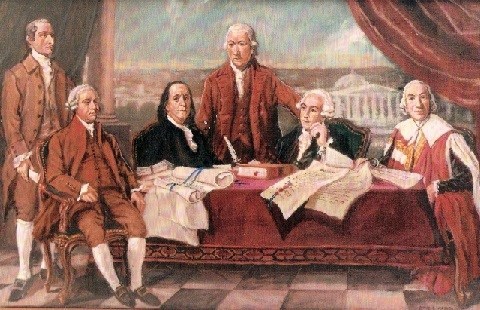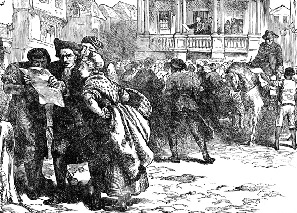 |
| This a portrait of Benjamin Franklin (1706-1790). (http://en.wikipedia.org/ (David Martin)) |
A hero's description varies from one person to another
and yet a few common traits sustain its existence. According to his essay, "Heroes," Charles F.
Harper states a hero "is someone who may attract attention but directs
that attention beyond himself or herself and reflects in their daily lives
everlasting values." When it comes down to heroes, the world is plentiful
of them. Even with so many heroes in the world, most Americans popularize U.S.
Presidents such as George Washington or Abraham Lincoln. On the other hand, the
name and impression of Benjamin Franklin either lacks the same quantity of
attention or the true details of the major roles Franklin played. Born in the
year 1706, Benjamin Franklin was the youngest son out of seventeen children. As
a youth in an indigent, Puritan family in Boston, Massachusetts, Franklin
"vowed to . . . improve people's lives" ("Benjamin
Franklin." Business), a statement he strived to reach throughout his life.
However, America never would have thought this underprivileged adolescent would
later grow up to become a talented man who earned his successes through his
personal efforts. Eventually, the same youth ended up a prosperous proprietor,
writer, and diplomat. Despite Franklin's reputable wealth and influence, it is
rather his strong tenacity, industry, and fairness that makes him a respectable
figure adored by many. During his lifetime, colonists considered Benjamin
Franklin a celebrity, but it is not solely his notable titles that make Franklin a hero. It
is his perseverance, diligence, and righteousness that continue to sustain his
reputation as one of America's greatest heroes.
 |
| A hospital built by Franklin in 1755. (en.wikipedia.org (William Strickland)) |
During his youth, Benjamin Franklin started out underprivileged; however, his will to ameliorate his own social standing achieved him the proud title as America's founding father and as a hero. For example, the article, "Benjamin Franklin," illustrates that because he was the youngest son of a large, poor-stricken family, Franklin could not attain all of the necessities he desired. During his childhood years, poverty inhibited his studies and academic growth because Franklin could not "attend formal schooling" ("Benjamin Franklin" Business). Despite the disadvantage in his impecunious upbringing, Franklin resisted his impoverished and unknowledgeable state. He taught himself how to read, and to his satisfaction, gained himself powerful speaking skills in French, Italian, Spanish, and Latin ("Benjamin Franklin" Business). Franklin's ability later allowed him to serve as a respectable diplomat between France, America, and Britain. Rather than stopping his schooling as a result of financial issues, Franklin continued to persist, earning him various, yet valuable, skills. No matter the difficulties inconveniencing Franklin, he incessantly worked towards his aspirations. After he yielded to the terms and conditions of the Stamp Act, angered colonists positioned their complaints and resentment towards Franklin "until reliable information was published demonstrating his unabated opposition to the act" ("Benjamin Franklin His Autobiography 1706-1757"). Franklin's acquiescence to the Stamp Act and "nomination of a friend and political ally as stamp distributor" ("Benjamin Franklin His Autobiography 1706-1757") damaged his reputation as a trustworthy agent. During this challenging period, Franklin and his family faced the indignation of several colonists. Even when opposed by the people he wanted to help, Franklin suffered. Consequently, Franklin's supporters helped him regain his repute and through his powerful debate for the repeal of the Stamp Act, he earned the colonists' trust again ("Benjamin Franklin His Autobiography 1706-1757"). In the situation, his tenacity and unwillingness to surrender to the hostility and corruption of others demonstrates how persistent he was. Franklin exhibits perseverance through his strong resolve to overcome any obstacles hindering him from achieving his ambitions.
 |
| The signing of the Treaty of Paris in 1783. (http://www.davidrwagner.com/signingoftreatyofparis (David Wagner)) |
Growing up in poverty and hardships, Franklin
demonstrates hard work will always aid one's philanthropic ideals. Thus,
Franklin manifested the spirit of a true hero. As a civic leader, Franklin
toiled towards a better future for all Americans. He started and completed
several civic projects that would benefit the community ("Benjamin
Franklin" Business). Franklin created the Junto believing that
 |
| Colonists react to the Stamp Act of 1765. (http://ushistoryimages.com/stamp-act.shtm (Markham)) |
Even with all the power, wealth, and influence Franklin gained throughout his life, he did not grow unscrupulous. Instead, Franklin lived as a righteous and fair hero. In 1727, Franklin created the Junto and allowed "All citizens in Philadelphia . . . access to the library, fire department, and insurance agency" ("Benjamin Franklin" Business). Franklin displayed he is not only charitable, but also fair by equally permitting Philadelphians to utilize these public services for their daily needs and lifestyle. Instead of earning profits by providing certain social classes the right to use these public buildings, Franklin granted all Philadelphian citizens access ("Benjamin Franklin" Business). His selfless mindset to provide all citizens equal rights, rather than a select few, depicts him as a fair hero. In addition to promoting equal privileges, Franklin exhibits the necessity to stand against what is wrong. The article, "Benjamin Franklin," portrays him as an impartial man. This is evident when it states, "Franklin also thought it incredibly selfish for the proprietor of Pennsylvania to try to avoid taxation of his vast lands" ("Benjamin Franklin" Encyclopedia). Even though Franklin once lived as a strong patriot of the Britain Empire, his patriotism slowly faded as he witnessed the injustice and corruption amongst his fellow peers ("Benjamin Franklin" Encyclopedia). When Franklin noticed Pennsylvania's proprietor avoiding the "taxation of his vast lands" ("Benjamin Franklin" Encyclopedia), he supported the Quaker Assembly as its agent and traveled to Britain to deliver justice. Instead of keeping silent of the inequity, he went through several troubles to enforce what was sincerely fair. Franklin's objectiveness to the situation demonstrated that he will not tolerate any form of unfairness within his jurisdiction. No matter the person or persons, Franklin will uphold his principles, forming him into an excellent icon for fairness.
Through his unyielding, assiduous, and just ways, Benjamin Franklin worked his way up to become one of America's greatest heroes and founding fathers. Franklin's firm resolution accomplished him a multitude of goals and inventions worth the amount of pain and challenges he suffered. His ability to multi-task with numerous civic projects along with his responsibilities as a diplomatic leader illustrates how he precisely is capable. Franklin's nonpartisan principles helped shape America into the independent nation it is today, fair and free. His endeavor to benefit other people despite his impoverished background makes him an inspiration for all. Although numerous heroes contributed to humanity using their status and wealth, Franklin paved his way to attain his reputation and accomplishments in changing this nation.
"Benjamin
Franklin." Business Leader Profiles
for Students. Ed. Sheila Dow and Jaime E. Noce. Vol. 1. Detroit: Gale,
1999. N. pag. Biography in Context.
Web. 7 May 2014.
"Benjamin Franklin." Encyclopedia of World Biography. 2nd ed.
Vol. 6. Detroit: Gale, 2004. 60-64. Gale Virtual Reference Library. Web. 29 Apr. 2014.
"Benjamin
Franklin His Autobiography 1706-1757." A Short Biography. George M
Welling, 2012. Web. 05 May 2014.
Lemay, J. A. Leo. "Franklin,
Benjamin 1706 - 1790." Oxford
Dictionary Of National Biography (2010): 1. Biography Reference Center. Web. 29 Apr. 2014.
Miles, Richard D., and Miles Richard D.
"Benjamin Franklin." Great
Lives From History: The Eighteenth Century(2006): 1. Biography Reference Center. Web. 29 Apr. 2014.
Page created on 5/20/2014 12:00:00 AM
Last edited 5/20/2014 12:00:00 AM
